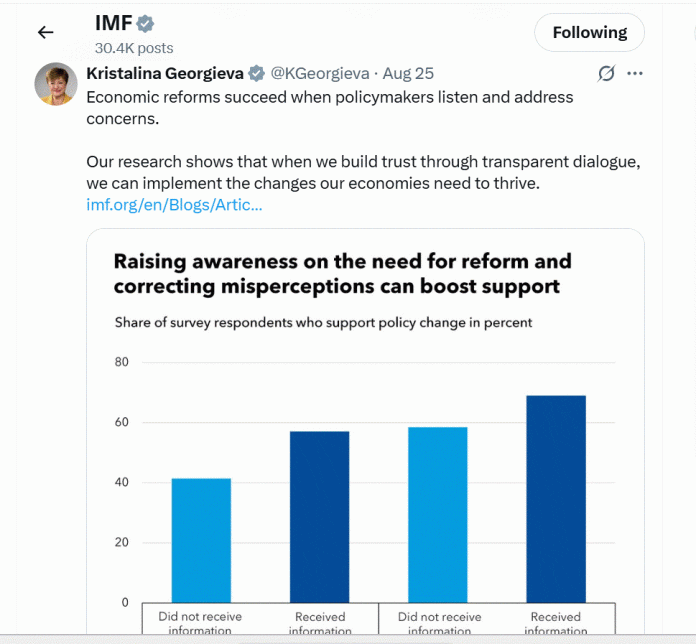International Monetary Fund Managing Director Kristalina Georgieva emphasized that successful economic reforms require transparent dialogue and public engagement, citing new research showing trust-building as crucial for implementing necessary policy changes.
Speaking about findings from the latest World Economic Outlook, Georgieva, who is serving her second term as IMF chief since October 2024, stressed that policymakers must actively listen to public concerns to gain support for transformative economic policies. The research demonstrates that when authorities build trust through transparent communication, they can more effectively implement reforms essential for economic growth.
The IMF’s analysis reveals a global economy trapped in sluggish growth patterns, driven by aging populations, insufficient business investment, and structural barriers preventing optimal allocation of capital and labor resources. These challenges are intensifying as demographic pressures mount and countries face massive investment demands from green energy and digital transformation initiatives.
Without addressing these structural issues, some nations risk falling further behind economically. The research identifies common reform priorities across multiple economies: streamlining market entry for new businesses, fostering competitive markets for goods and services, encouraging workforce participation, and better integrating immigrant workers into labor markets.
However, implementing such reforms has become increasingly challenging amid rising public discontent following the global financial crisis. The IMF found that effective communication, civic engagement, and earning public trust are essential keys to advancing pro-growth reforms.
The Fund’s comprehensive analysis examined factors influencing public attitudes toward economic reforms through surveys of over 12,000 respondents across six representative countries. The findings reveal that resistance to reforms extends far beyond simple economic self-interest, with personal beliefs, perceptions, and behavioral factors accounting for approximately 80% of public support decisions.
Particularly significant is the research finding that knowledge gaps and misperceptions about reform necessity and policy effects serve as primary predictors of varying support levels. This discovery offers policymakers a concrete pathway for building broader acceptance of necessary changes.
The IMF research suggests that addressing information deficits and correcting misunderstandings about policy impacts could substantially improve public backing for essential economic reforms. This insight provides an actionable framework for governments struggling to implement needed changes amid public skepticism.
Current global growth projections underscore the urgency of these reforms. The IMF projects global growth at 3.3 percent for both 2025 and 2026, with divergent paths and medium-term risks tilted to the downside. These modest growth rates highlight the need for structural improvements to boost economic performance.
The research comes as governments worldwide grapple with policy uncertainties and shifting priorities. Recent IMF analysis noted that uncertainties have climbed to new highs as governments reorder policy priorities, creating a highly unpredictable environment.
For policymakers, the IMF findings suggest a strategic approach combining clear communication about reform benefits, genuine public engagement in policy design, and recognition that some groups may require support during transition periods. This framework acknowledges that successful reforms require not just sound economics but also social acceptance.
The research emphasizes that building public trust through transparent dialogue enables authorities to implement the structural changes their economies need to thrive in an increasingly competitive global environment. Success depends on policymakers’ willingness to engage meaningfully with public concerns while clearly explaining reform benefits.
As demographic transitions accelerate and technological disruption continues, the IMF analysis provides a roadmap for achieving the public support necessary to implement growth-enhancing reforms that can help countries navigate these complex economic challenges.
Source: newsghana.com.gh









